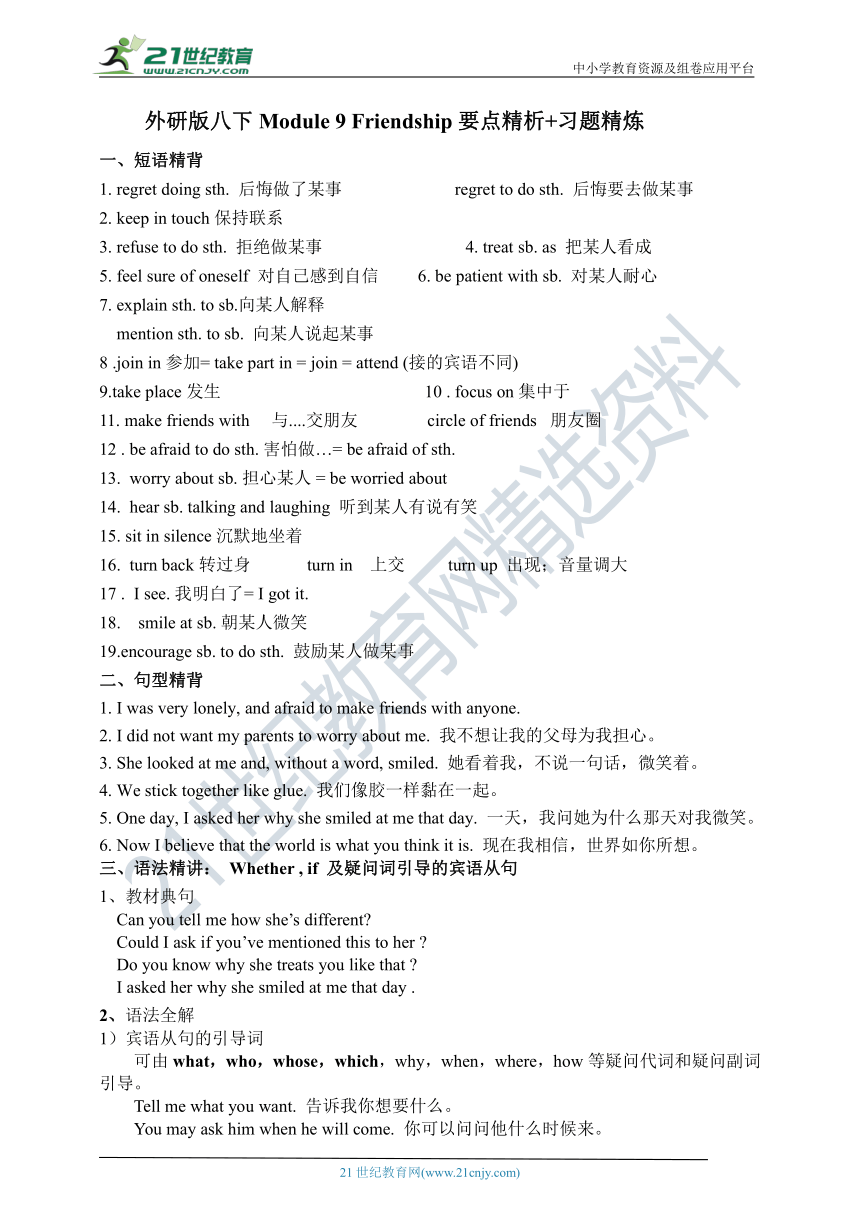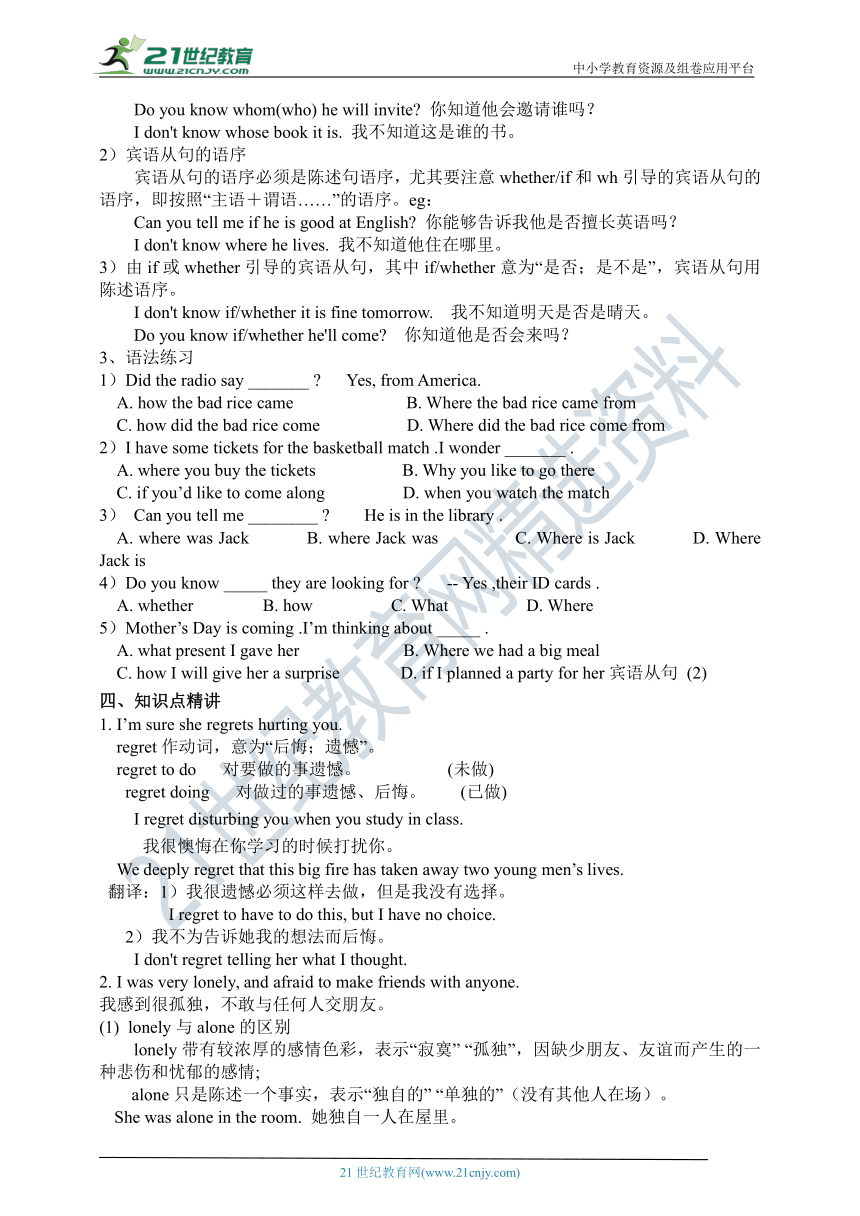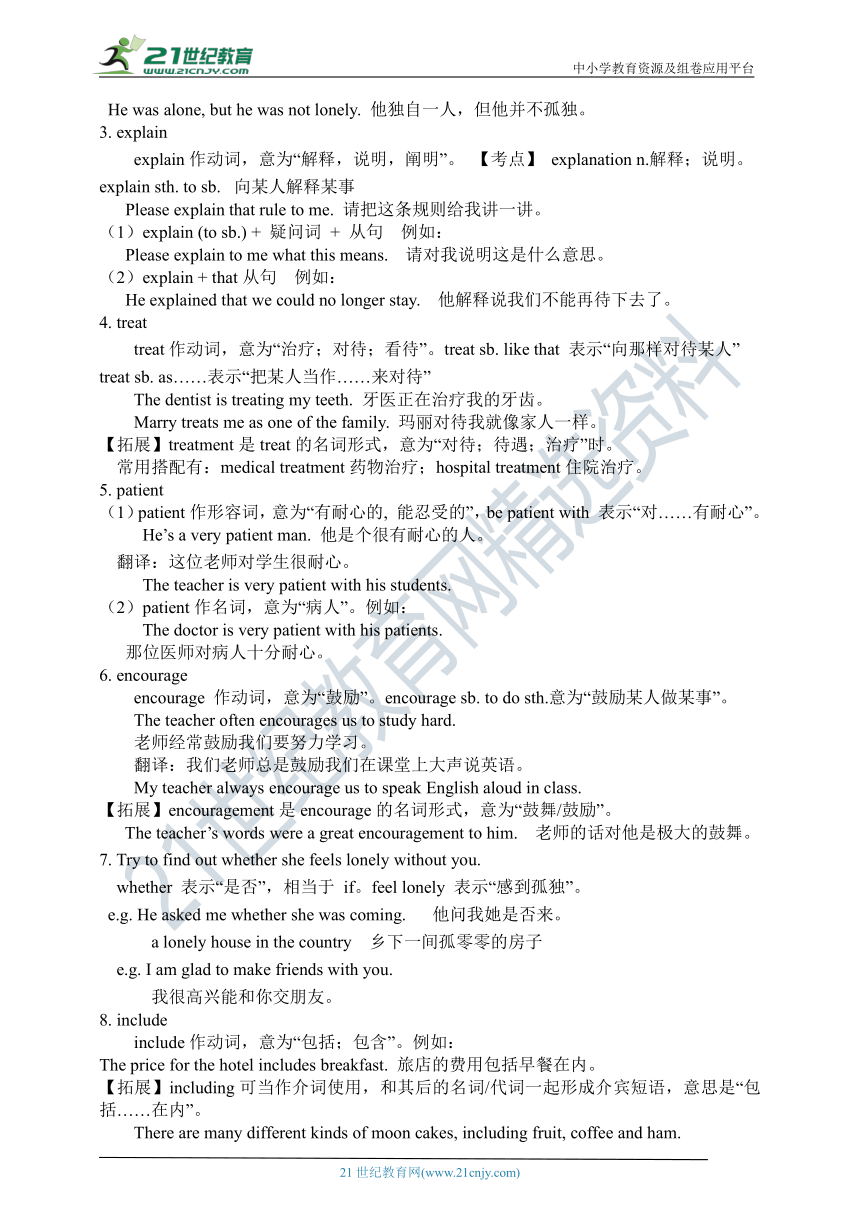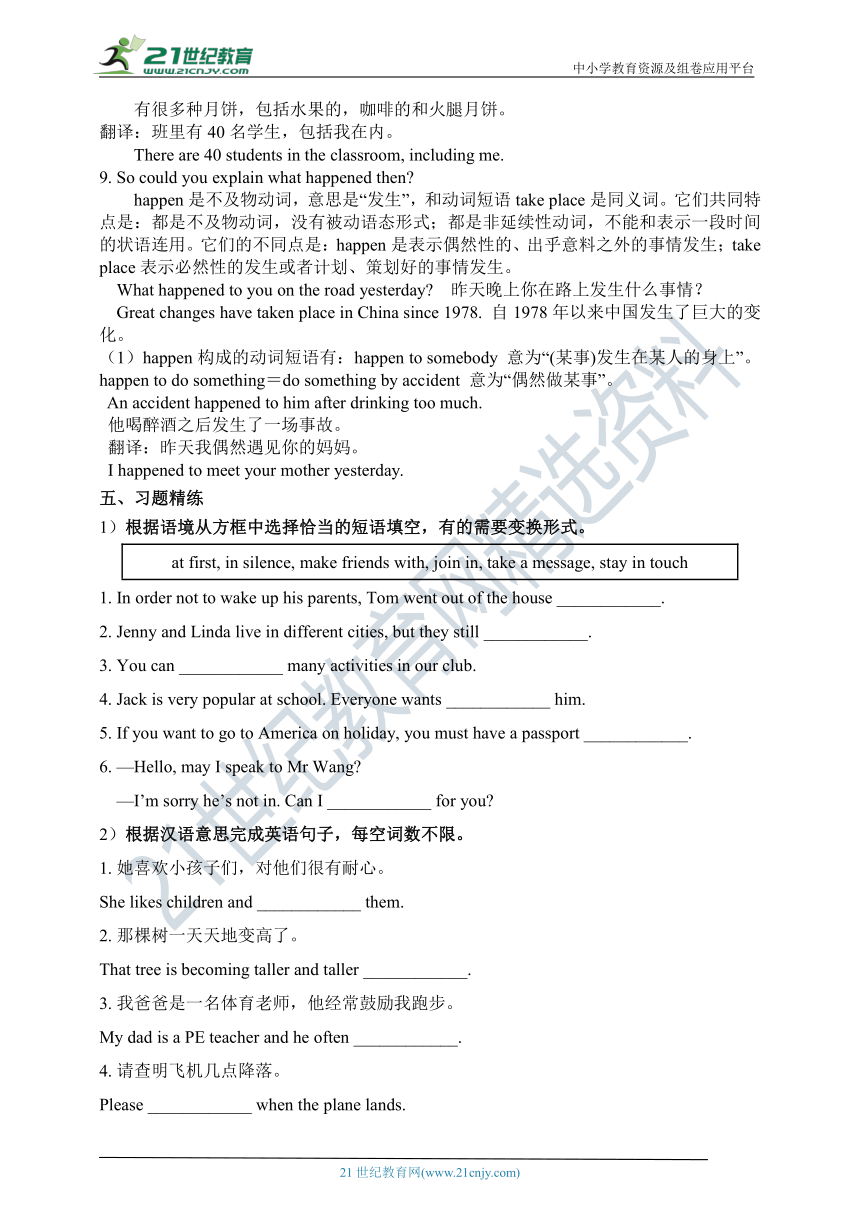Module 9 Friendship 模块同步学案(要点精析+习题精炼)
文档属性
| 名称 | Module 9 Friendship 模块同步学案(要点精析+习题精炼) |

|
|
| 格式 | zip | ||
| 文件大小 | 1.2MB | ||
| 资源类型 | 试卷 | ||
| 版本资源 | 外研版 | ||
| 科目 | 英语 | ||
| 更新时间 | 2020-03-29 00:00:00 | ||
图片预览




文档简介
中小学教育资源及组卷应用平台
外研版八下Module 9 Friendship要点精析+习题精炼
一、短语精背
1.?regret?doing?sth. 后悔做了某事 regret?to do?sth. 后悔要去做某事
2. keep?in?touch保持联系?
3. refuse?to?do?sth. 拒绝做某事? 4.?treat?sb.?as 把某人看成
5. feel?sure?of?oneself 对自己感到自信? 6.?be?patient?with?sb. 对某人耐心?
7.?explain?sth. to?sb.向某人解释??
mention?sth.?to?sb. 向某人说起某事?
8?.join?in参加= take part in = join = attend (接的宾语不同)?
9.take?place?发生? 10?. focus?on?集中于?
11.?make friends with? 与....交朋友 circle of friends ?朋友圈
12?.?be?afraid?to?do?sth.?害怕做…= be afraid of sth. ?
13.??worry?about?sb.?担心某人?= be worried about
14.??hear?sb.?talking?and?laughing 听到某人有说有笑?
15.?sit?in?silence沉默地坐着?
16.??turn?back转过身? turn in 上交 turn up 出现;音量调大
17?.??I?see.?我明白了= I got it.
??smile?at?sb.?朝某人微笑?
19.encourage?sb.?to?do?sth. 鼓励某人做某事?
二、句型精背
1.?I was very lonely, and afraid to?make friends with?anyone.
2.?I did not want my parents to?worry about?me. 我不想让我的父母为我担心。
3.?She looked at me and, without a word, smiled. 她看着我,不说一句话,微笑着。
4.?We stick together like glue. 我们像胶一样黏在一起。
5.?One day, I asked her why she smiled at?me that day. 一天,我问她为什么那天对我微笑。
6.?Now I believe that the world is what you think it is. 现在我相信,世界如你所想。
三、语法精讲: Whether , if 及疑问词引导的宾语从句
1、教材典句
Can you tell me how she’s different?
Could I ask if you’ve mentioned this to her ?
Do you know why she treats you like that ?
I asked her why she smiled at me that day .
语法全解
1)宾语从句的引导词
可由what,who,whose,which,why,when,where,how等疑问代词和疑问副词引导。
Tell me what you want. 告诉我你想要什么。
You may ask him when he will come. 你可以问问他什么时候来。
Do you know whom(who) he will invite? 你知道他会邀请谁吗?
I don't know whose book it is. 我不知道这是谁的书。
2)宾语从句的语序
宾语从句的语序必须是陈述句语序,尤其要注意whether/if和wh?引导的宾语从句的语序,即按照“主语+谓语……”的语序。eg:
Can you tell me if he is good at English? 你能够告诉我他是否擅长英语吗?
I don't know where he lives. 我不知道他住在哪里。
3)由if或whether引导的宾语从句,其中if/whether意为“是否;是不是”,宾语从句用陈述语序。
I don't know if/whether it is fine tomorrow. 我不知道明天是否是晴天。
Do you know if/whether he'll come? 你知道他是否会来吗?
3、语法练习
1)Did the radio say _______ ? Yes, from America.
A. how the bad rice came B. Where the bad rice came from
C. how did the bad rice come D. Where did the bad rice come from
2)I have some tickets for the basketball match .I wonder _______ .
A. where you buy the tickets B. Why you like to go there
C. if you’d like to come along D. when you watch the match
3) Can you tell me ________ ? He is in the library .
A. where was Jack B. where Jack was C. Where is Jack D. Where Jack is
4)Do you know _____ they are looking for ? -- Yes ,their ID cards .
A. whether B. how C. What D. Where
5)Mother’s Day is coming .I’m thinking about _____ .
A. what present I gave her B. Where we had a big meal
C. how I will give her a surprise D. if I planned a party for her宾语从句 (2)
四、知识点精讲
1. I’m sure she regrets hurting you.
regret作动词,意为“后悔;遗憾”。
regret to do 对要做的事遗憾。 (未做)
regret doing 对做过的事遗憾、后悔。 (已做)
I regret disturbing you when you study in class.
我很懊悔在你学习的时候打扰你。
We deeply regret that this big fire has taken away two young men’s lives.
翻译:1)我很遗憾必须这样去做,但是我没有选择。
I regret to have to do this, but I have no choice.
2)我不为告诉她我的想法而后悔。
I don't regret telling her what I thought.
2. I was very lonely, and afraid to make friends with anyone.
我感到很孤独,不敢与任何人交朋友。
lonely与alone的区别
lonely带有较浓厚的感彩,表示“寂寞” “孤独”,因缺少朋友、友谊而产生的一种悲伤和忧郁的感情;
alone只是陈述一个事实,表示“独自的” “单独的”(没有其他人在场)。
She was alone in the room. 她独自一人在屋里。
He was alone, but he was not lonely. 他独自一人,但他并不孤独。
3. explain
explain作动词,意为“解释,说明,阐明”。 【考点】 explanation n.解释;说明。
explain sth. to sb.? 向某人解释某事
Please explain that rule to me. 请把这条规则给我讲一讲。
(1)explain (to sb.) + 疑问词 + 从句 例如:
Please explain to me what this means. 请对我说明这是什么意思。
(2)explain + that从句 例如:
He explained that we could no longer stay. 他解释说我们不能再待下去了。
4. treat
treat作动词,意为“治疗;对待;看待”。treat sb. like that 表示“向那样对待某人”
treat sb. as……表示“把某人当作……来对待”
The dentist?is treating?my teeth. 牙医正在治疗我的牙齿。
Marry?treats?me?as?one of the family. 玛丽对待我就像家人一样。
【拓展】treatment是treat的名词形式,意为“对待;待遇;治疗”时。
常用搭配有:medical treatment?药物治疗;hospital treatment?住院治疗。
5. patient
(1)patient作形容词,意为“有耐心的, 能忍受的”,be patient with 表示“对……有耐心”。
He’s a very patient man. 他是个很有耐心的人。
翻译:这位老师对学生很耐心。
The teacher is very patient with his students.
(2)patient作名词,意为“病人”。例如:
The doctor is very patient with his patients.
那位医师对病人十分耐心。
6. encourage
encourage 作动词,意为“鼓励”。encourage sb. to do sth.意为“鼓励某人做某事”。
The teacher often encourages us to study hard.
老师经常鼓励我们要努力学习。
翻译:我们老师总是鼓励我们在课堂上大声说英语。
My teacher always encourage us to speak English aloud in class.
【拓展】encouragement是encourage的名词形式,意为“鼓舞/鼓励”。
The teacher’s words were a great encouragement to him. 老师的话对他是极大的鼓舞。
7. Try to find out whether she feels lonely without you.
whether 表示“是否”,相当于 if。feel lonely 表示“感到孤独”。
e.g. He asked me whether she was coming. 他问我她是否来。
a lonely house in the country 乡下一间孤零零的房子
e.g. I am glad to make friends with you.
我很高兴能和你交朋友。
8. include
include作动词,意为“包括;包含”。例如:
The price for the hotel includes breakfast. 旅店的费用包括早餐在内。
【拓展】including可当作介词使用,和其后的名词/代词一起形成介宾短语,意思是“包括……在内”。
There are many different kinds of moon cakes, including fruit, coffee and ham.
有很多种月饼,包括水果的,咖啡的和火腿月饼。
翻译:班里有40名学生,包括我在内。
There are 40 students in the classroom, including me.
9. So could you explain what happened then?
happen是不及物动词,意思是“发生”,和动词短语take place是同义词。它们共同特点是:都是不及物动词,没有被动语态形式;都是非延续性动词,不能和表示一段时间的状语连用。它们的不同点是:happen是表示偶然性的、出乎意料之外的事情发生;take place表示必然性的发生或者计划、策划好的事情发生。
What happened to you on the road yesterday? 昨天晚上你在路上发生什么事情?
Great changes have taken place in China since 1978. 自1978年以来中国发生了巨大的变化。
(1)happen构成的动词短语有:happen to somebody 意为“(某事)发生在某人的身上”。happen to do something=do something by accident 意为“偶然做某事”。
An accident happened to him after drinking too much.
他喝醉酒之后发生了一场事故。
翻译:昨天我偶然遇见你的妈妈。
I happened to meet your mother yesterday.
五、习题精练
1)根据语境从方框中选择恰当的短语填空,有的需要变换形式。
at first, in silence, make friends with, join in, take a message, stay in touch
1. In order not to wake up his parents, Tom went out of the house ____________.
2. Jenny and Linda live in different cities, but they still ____________.
3. You can ____________ many activities in our club.
4. Jack is very popular at school. Everyone wants ____________ him.
5. If you want to go to America on holiday, you must have a passport ____________.
6. —Hello, may I speak to Mr Wang?
—I’m sorry he’s not in. Can I ____________ for you?
2)根据汉语意思完成英语句子,每空词数不限。
1.?她喜欢小孩子们,对他们很有耐心。
She likes children and ____________ them.
2.?那棵树一天天地变高了。
That tree is becoming taller and taller ____________.
3.?我爸爸是一名体育老师,他经常鼓励我跑步。
My dad is a PE teacher and he often ____________.
4.?请查明飞机几点降落。
Please ____________ when the plane lands.
5.?他总是拒绝和我打网球,我非常伤心。
He always ____________ tennis with me. I’m very sad.
3)根据对话内容从方框中选择能填入空白处的最佳选项补全对话,其中有两项多余。
A: Hello, this is Problem Helpline. (1)______
B: Well, I have a problem with my parents.
A: (2)______
B: My dream is to be a presenter. And I find a job at our school’s radio station. But my parents aren’t happy.
A: They worry that you’ll spend less time studying if you work.
B: Yeah! You’re right. (3)______
A: Why not work harder and get better marks?
B: I see. (4)______ And they will allow me to work at the radio station.
A: You’re very smart.
B: (5)______
A: Don’t mention it. I hope your dream will come true one day.
B: Thanks a lot.
A. What should I do? B. How can I help you? C. Thank you for your advice. D. How long have you worked? E. Tell me what happened to you. F. Why not ask for another part-time job? G. Then my parents won’t worry about my study.
4)完型填空
A little boy named Ham became very ill.He had to lie in bed all day,unable to move.He spent his days feeling sad and blue.
There wasn’t much he could do except that he looked out of the 1 .Time passed,and his illness frustrated him until one day he saw a strange 2 in the window.It was a penguin eating a sausage sandwich.The penguin got in through the open window,and said“good afternoon”to Ham,turned around,and 3 quickly.
Of course,Ham was very 4 .He was still trying to work out what had happened.Outside his window he saw a monkey busy blowing up a balloon.At first Ham asked himself 5 that could possibly be,but after a while,as more and more crazy looking characters appeared outside the window,he couldn’t help 6 and found it hard to stop.
An elephant jumped on a stone,or a dog wore a pair of glasses and acted in a 7 way.The little boy didn’t tell anyone about this.Those strange characters ended up putting joy back in his heart,and in his body.Before long,his health had 8 so much that he was able to go back to school again.
There he told his classmates all that he had 9 .While he was talking to his best friend,he saw something coming out of his friend’s school bag.Ham asked his friend what it was,and Ham was so insistent(坚持) that 10 his friend had to show him what was in the bag.
There,inside,were all the things that his best friend had been using to try to cheer up the little boy!
And from that day on,Ham always did his best to make sure that no one felt sad and alone.
1.A.roof B.hole C.window D.wall
2.A.photo B.painting C.sign D.shape
3.A.left B.slept C.flew D.drove
4.A.annoyed B.surprised C.bored D.tired
5.A.what B.which C.when D.where
6.A.crying B.laughing C.running D.coughing
7.A.funny B.rude C.dull D.strict
8.A.grown B.improved C.increased D.developed
9.A.acted B.heard C.experienced D.dreamed
10.A.quickly B.suddenly C.immediately D.finally
外研版八下Module 9 Friendship要点精析+习题精炼答案
五、习题精练
1) 1. in silence 2. stay in touch 3. join in
4. to make friends with? 5. at first 6. take a message
2)1. is patient with? 2. day by day?
3. encourages me to run? 4. find out? 5. refuses to play?
3) 1-5 BEAGC
4)答案。
1.C。由下文的“in the window”和“through the open window”可推知他只能“向窗外看”,故答案选C,意为“窗户”。
2.D。由下文可知都是汉姆的同学为使他早日重返校园而使用的一些物体的“模型”,故答案选D,意为“形状;样子”。
3.A。由前文的“got in through the open window(从开着的窗户进入)”,和“turned around(转身,掉头)”可知,此处应填left(离开)。故答案选A。
4.B。根常识窗户外边出现那个会动的东西,又消失了,可推知汉姆一定是很“惊讶的”。
5.A。联系上下文可推知对于这样令人惊讶的事情汉姆一定想知道那可能是“什么”。
6.B。由上文“more and more crazy-looking characters”可知答案选B,意为“笑”。
7.A。上文大象跳到石头上或狗戴着眼镜在表演可知都是很“滑稽可笑的”,故答案选A。
8.B。由下文他能够重返校园可推知他的健康状况有所“好转”,故答案选B,improve意为“提高;改善”。
9.C。汉姆生病的时候所见到的那些东西及带给他的快乐对于他来说都是很难忘怀的“经历”,故答案选C,experience意为“经历;经验”。
10.D。由上文汉姆的坚持和下文他的朋友不得不让他看,可知答案选D,意为“最后”。
21世纪教育网 www.21cnjy.com 精品试卷·第 2 页 (共 2 页)
HYPERLINK "http://21世纪教育网(www.21cnjy.com)
" 21世纪教育网(www.21cnjy.com)
同课章节目录
- Module 1 Feelings and impressions
- Unit 1 It smells delicious.
- Unit 2 I feel nervous when I speak Chinese .
- Unit 3 Language in use
- Module 2 Experiences
- Unit 1 I've also entered lots of speaking competi
- Unit 2 They have seen the Pyramids.
- Unit 3 Language in use
- Module 3 Journey to space
- Unit 1 Has it arrived yet?
- Unit 2 We have not found life on any other planet
- Unit 3 Language in use
- Module 4 Seeing the docto
- Unit 1 I haven't done much exercise since I got m
- Unit 2 We have played football for a year now
- Unit 3 Language in use
- Module 5 Cartoons
- Unit 1 It's time to watch a cartoon.
- Unit 2 Tintin has been popular for over eighty yea
- Unit 3 Language in use
- Revision module A
- Module 6 Hobbies
- Unit 1 Do you collect anything ?
- Unit 2 Hobbies can make you grow as a person.
- Unit 3 Language in use
- Module 7 Summer in Los Angeles
- Unit 1 Please write to me and send me some photos
- Unit 2 Fill out a form and come to learn English
- Unit 3 Language in use
- Module 8 Time off
- Unit 1 I can hardly believe we are in the city ce
- Unit 2 We thought somebody was moving about
- Unit 3 Language in use
- Module 9 Friendship
- Unit 1 Could I ask if you've mentioned this to he
- Unit 2 I believe that the world is what you think
- Unit 3 Language in use
- Module 10 On the radio
- Unit 1 I hope that you can join us one day
- Unit 2 It seemed that they were speaking to me in
- Unit 3 Language in use
- Revision module B
